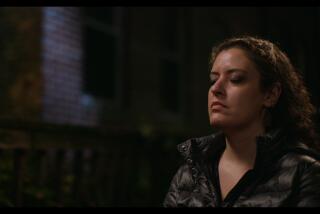Eccentrics May Have Found Key to Happiness, Psychologist Says
- Share via
Most families have had to tolerate at least one bona fide eccentric--the great aunt with the habit of speaking only in Shakespearean quotes, or the brother-in-law who remains sequestered in his garage assembling perpetual motion machines.
Some families cope by having little to do with these odd relations.
But those who have ostracized an eccentric in the past might want to reconsider. If Scottish psychologist David Weeks is right, that zany aunt or daffy in-law is happier, healthier and longer-lived than those of us who conform to social standards.
He asserts that in addition to being happier, eccentrics have the capacity to bring healing and happiness to people with whom they’re in close contact. “Eccentricity certainly does rub off,” said Weeks, 40.
If Weeks himself doesn’t exactly claim to be an eccentric, he said in a telephone interview that he has become more cheerful and more offbeat since getting to know nearly 200 decidedly different individuals in the course of an ongoing study of eccentricity. “The experience has loosened up my horizons,” he said. “I’m less worried about what people think of my ideas. More willing to be speculative.”
Weeks, originally from Garwood, N.J. (he moved to Scotland in 1975), located his first crop of eccentrics in Edinburgh, Dublin, Ireland, and small villages in the south of England, an area he calls “a heartland of eccentricity.” As he expands his search to the United States, he is finding California to be equally fruitful, with a full 50% of his American subjects residing in this state.
By dictionary standards an eccentric is “out of the ordinary, odd, unconventional.”
Weeks’ aim is to encourage the acceptance and cultivation of eccentricity in society, he said, and where necessary, he also hopes to familiarize mental health workers with eccentricity as a condition distinct from mental illness. This new understanding, he believes, will prevent patients from being wrongfully committed to mental hospitals when they are simply eccentric (an infrequent but not unheard-of scenario, Weeks said).
While eccentrics may exhibit one or two symptoms that are consistent with mental illness, they retain a hold on reality and have insight into their own behavior, he said. The psychologist has identified 20 traits indicating that a person may be eccentric.
Long History as Loners
According to Weeks, eccentrics are often loners from as early as age 7, they are convinced they are different or visionary, they proffer profound ideas that don’t quite operate within the laws of logic, they are egotistical, and they don’t hesitate to bring up their unusual preoccupations with anyone they meet.
An all-consuming preoccupation with a single topic or topics is the most characteristic trait of eccentrics. For instance, a San Francisco self-described eccentric who is participating in Weeks’ study is obsessed with the game of chess as a key to spiritual knowledge. The subject, a 40-year-old accountant, began playing chess at age 7. Now that he has a computerized chess game, he estimates he plays more matches in a week than most people play in a lifetime.
In his original sample group from Scotland, Weeks discovered a 43-year-old potato inspector who is enthralled with everything having to with the potato--its history, appearance, lore and uses.
The psychologist also rounded up a number of eccentrics in the “deviant science” category who have devoted their lives to inventing fantastical machines--such as a man who devised a “twinkling” apparatus, which produces sparkles.
Hired by Computer Firm
Not all of the machines are wacky. Weeks said one of the world’s leading computer firms has hired him as a consultant to help recruit some of the eccentric scientist types he has studied. What the company realizes, Weeks said, is that eccentricity is sometimes akin to genius. “Geniuses tend to have a better formal education,” Weeks said, defining the difference, “while eccentrics are amateurs.”
The psychologist began his own search for eccentrics by pinning up notices in pubs, supermarkets, train stations and other public places: ECCENTRIC? If you feel that you might be, contact David Weeks.
Soon Weeks and his assistant were receiving an odd assortment of visitors at their offices in the Royal Edinburgh Hospital, where Weeks is principal psychologist. There was the woman who arrived for her interview dragging along a red plastic lobster on a leash. There was the man, named Robin Hood, who installs bank security equipment for a living and who spends his free time toting a bow and arrow through Sherwood Forest.
Weeks’ research showed that eccentrics have robust senses of humor--the Americans even more than the British group--and that they possess a single-minded curiosity that keeps them involved in life.
Vital to Others
He said it occurred to him in the bath one day that he was dealing with much more than a minor aspect of human nature. His subjects were not oddities, he realized, but living examples of people who manage to live with zest and fulfillment.
It dawned on him that his research could be vital to others in their quests for happiness. This has already proved true in the effect the work has had on Weeks and his non-eccentric patients. He said he has been able to encourage a sense of humor and a less self-conscious attitude in the psychiatric patients he sees for a variety of maladies. “The message I’ve had for patients since beginning this work is to lighten up a bit,” he said.
Zimya Trend, a self-described eccentric from San Francisco, said she agrees with Weeks’ conviction that we’d have a healthier planet if eccentricity were encouraged in society at large.
“An eccentric is a person whose modus operandi is not linear,” she said. “I’ve always considered myself not neurotic, not psychotic, but eccentric. People have always said that I have a zest for life.”
Variety of Subjects
Trend, a 45-year-old film maker currently completing her fourth degree at San Francisco State University, is intrigued with a variety of subjects, unlike some eccentrics who remain fixed on a single idea. Trend likes electronics, pharmacology, neurology. “People are always saying to me, why do you want to know about that ?”
Rosalie Wasserman is another Bay Area resident who responded to Weeks’ call for eccentrics. (Those who wish to take part in the study may write Weeks at the Royal Edinburgh Hospital, Jardine Clinic, Morningside Place, Edinburgh EH10 SHF.) The 62-year-old daughter of a once-famous European diva, Wasserman said, “I never thought of myself as the average human being from early on in childhood.”
Wasserman said she sometimes clashes with the more standardized values of those around her as she attempts to uphold her old-world sense of grace and etiquette in modern-day San Mateo. In an attempt to be gracious, Wasserman attends AIDS benefits, befriends homeless people and chats with stray dogs in the park.
“Is that eccentric or is that normal?” Wasserman asked. “To me it’s just caring.”


